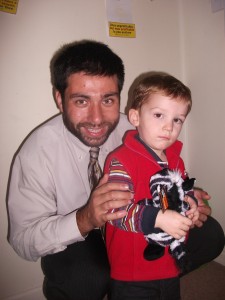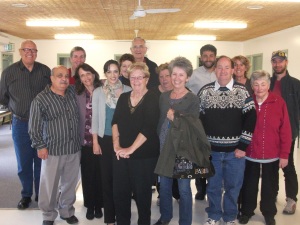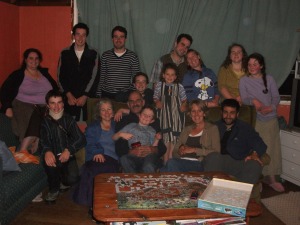Msindisi Monthly # 117
SALVADOR & DIANNE’S MSINDISI MONTHLY
Number: 117 Jun 2014
PO BOX 1481
VRYHEID 3100
KWAZULU NATAL
SOUTH AFRICA
+27 (0) 728311008
+27 (0) 723843876
Email: msindisi@gmail.com
salv.di@gmail.com
KwaZulu Mission Website: http://www.kwazulumission.com
KwaZulu Mission Facebook page:https://www.facebook.com/kwazulumission
The 31st April was the start of our travels to Australia and New Zealand. After our 12-hour flight to Aussie, we landed feeling remarkably fresh and ready to meet new friends and catch up with faithful friends and supporters.
Our first stop was catching up with Josh and Pricilla in Sydney and meeting up with the David Mule who visited KwaZulu Mission in 2003.
3rd May – we travelled onto Melbourne where our dear brother Michael Chamberlain met us. He drove us to the home of Lionel and Suzanne who had been missionaries in china for several years. Their son Jad organized a radio interview with us hosted by himself and a brother called Chris for 7 pm that evening. After a lovely meal and much chatting and sharing of musical talents, we travelled to the studio. Salvador answered questions and shared of the work in South Africa. That night, our dear friends Pam and Vic Mott came to collect us and take us back to their home.
The next day was a special meeting with Pilgrim Fellowship. We got to catch up with our dear friend Marg Godwin and finally meet the Shaftons who we had only had contact with but never met. It was a wonderful day with Salvador sharing the word and then a fellowship lunch. Over the next few days, we meet up again over lunch dates and got to chat longer. Pam and Vic were amazing taking us to tourist spots whenever there was a spare moment. We got to stroke Koalas and Kangaroos and take a tour of the Wonthaggi State Coal Mine.

Peta who visited South Africa with her parents in 2004. She is now married to John and lives in Melbourne.
The night before flying out to Christchurch, New Zealand, we met up again at Lionel and Suzanne’s home where there was a home-cell group meeting. After meeting the group and sharing the work in South Africa, we had to say our quick goodbyes to catch our midnight flight to NZ.
On the 8th May, we landed in the land of the long white cloud. Marijke had visited us in KZN in 2009 with Lina from Australia, while they were at Ebyown children’s village in Springs with Dave and Lyn Royle. This was our first time meeting up again. Since last seeing, her she had married Jake Harrison and they had had their first child Caitlyn. The day we arrived their second child Joel had come into the world only a few days earlier. It was a special visit. That evening we also shared about the work in SA then reminisced catching up on the time between last seeing her.
Then the day arrived 10th May when Di would get to see her family in Palmerston North. We had last visited in 2008. As you can imagine there was lots of hugs, tears, and stories that day. We had such grateful hearts that this time was possible.
The next day Sal was sharing at Emmanuel, Di’s home church. He spoke on the stilling of the storm in Mark’s Gospel. In the morning and the evening meeting was on having a zeal for God’s house. Between meetings, we shared a lunch with the fellowship. This gave us time to chat with Jacob Meads and meet his wife to be Raewyn Bellringer.

Salvador with little Salvador Teulon. His parents, Austin and Grace named him after Salvador. Austin and Grace fellowship in Emmanuel Congregation.
Our arrival in NZ provoked many thoughts. For several days, it felt like we were in a movie set. Everything was very neat, clean and precise. The ease of jumping into a shower, running a tap with instant hot water, and flicking on a light switch day after day gave us such gratitude. May we never take these common things for granted. Our hearts often returned to Phumlani and Celani and the difference in their lives. We had the pleasure of meeting up with Lindsay and Eril Shotton who started the radio ministry www.truelightfm.co.nz . They have had to remove themselves from the running of the station due to health issues and a new board has been appointed. We also had much joy when we got to see Joan, the mother of Glenys, who is a friend of Di’s. Joan 92 was recovering from surgery. Di had been praying she would get to see her as 2 years back she had given her life to the Lord and been born spiritual again. It was a wonderful reunion however she is still very unwell and having to go through many changes in her life.
Between family and meeting up with people, we were invited to speak in a couple of fellowships. There was an evening set aside for sharing at Emanuel, Di’s home church along with fellowships in Wellington and Auckland. While in Wellington, Lester Fensom had organised a meeting where Sal spoke again on having a zeal for God’s house and in Auckland with Fanie Du Toit “Crossroads Christian Congregation”, he spoke on the adoption as sons. These have been precious times; we have met some wonderful people.

Olaf and Charnel Hinze who used to attend our cell group in South Africa. Now Olaf works on a farm in New Zealand

Salvador with Dion and Margie De Klerk who live in Hamilton but used to live in Vryheid, South Africa.
During the month of June we will be staying around Palmerston North, as Sal has more teaching appointments at Emanuel on the 8th and 22nd and a meeting in Bulls on the 11th.
June has been set aside to spend more time with family and friends. Di’s sister from Australia is arriving and family will be celebrating their mum’s birthday on 15th June. This will be the first time all the family has been together for 15 years. We depart NZ on the 27th of the month for Sydney.
Prayer needs:
- Please Pray for Gogo, Phumlani’s mum. We hear she has deteriorated with her cancer. Please pray for her salvation.
- Please pray for the Lord to lead us and use us here in New Zealand.
- Please pray for the meetings in Palmerston North, Bulls and in Sydney.
CHAPTER 8
THE COMMITMENT OF MARRIAGE: MARRIAGE IS A COVENANT
There was a couple I and my wife knew who went to a wedding and met some people that had been married three years previously who our friends saw had been divorced within two or three years. It seems so common today that people enter marriage and easily break up with the excuse that the marriage is not working out. Apparently the divorced couple had gone to a psychologist who had counselled them that they needed to have a child to try to unite them. But as the last chapter argued, a couple can not base their marriage on children. So the couple still split but the husband was left with a child. Many people do not seem the concept of the covenant. There are three basic aspects to a covenant:
We will see what a covenant is composed of, or the fabric of a covenant.
We will also understand that a covenant comes with conditions.
And lastly we will uphold the truth that a covenant is permanent.
The Fabric of a Covenant
The difference between a contract and a covenant lies with the fact that a contract is usually for a period of time. So if you sign a contract with someone you sign and agree to adhere to the terms and conditions and will give a period of time as notice for the termination of the said contract. The contract can be terminated by agreement. You can agree to terminate the contract, but you cannot agree to terminate the marriage covenant. A covenant is meant to last.
Proverbs 2:17
That leaves the companion of her youth and forgets the covenant of her God;
Marriage is not cohabitation between two people. God regards marriage as a covenant before Him, whether the couple got married in Church or not. So the covenant is a binding agreement between two parties and its consists of at least four strands.
The first strand is “complete oneness”. Different covenants have different levels of oneness. There are covenants between friends. There are covenants between nations. However, the marriage covenant is to be stronger. The couple is called to a total oneness.
Genesis 2:23-24
23 The man said, “This is now bone of my bones, And flesh of my flesh; She shall be called Woman, Because she was taken out of Man.” 24 For this reason a man shall leave his father and his mother, and be joined to his wife; and they shall become one flesh.
Adam states that Eve is bone of his bones and flesh of his flesh, which means at least two things. The word for bone in Hebrew is “Etsem” and derives from the same word “tree” in Hebrew and which denotes the “fastening of the eyelids together” which symbolizes strength. Bones are the strength of one’s body. So when the Bible speaks of dryness of bones it means that there is no power or poor health. When bones are brittle, a person has lost their power. The flesh, however, can speak of weakness. Notice in the New Testament it speaks about the weakness of the flesh. So it is almost like an old Hebrew way of saying, “in strength or weakness”. In a similar vein, people today make the vow “for better for worse, for richer or poorer, in sickness and health”, though there was no sickness before the fall. However, in another sense Adam is saying that she is the same bone as his bone and the same flesh of his flesh, which speaks of the compatibility of man and wife. A certain Jewish teacher put it this way: “If you are married, tough luck. It is too late. However if you are looking to get married, look for compatibility.” Thus, this is to do with the Jewish idea of matchmaking. God wants a match, and the next chapter will examine this truth. Ideally a marriage should be formed out of matching two individuals. If a couple is married, it is too late. The couple has live with each other, even if the partners are not compatible. So in this context of “bone of my bone and flesh of my flesh” there is the communication of the concept of unity. There is a unity in sharing of weaknesses and strengths. There is a legal unity, an emotional unity, and there is a physical unity. A man leaves his father and mother, cleaves to his wife and the two become one flesh. Marriage should entail unity in every sense of the word. Thus, the marriage covenant brings with it a unity between a man and a woman; it is a publicly evidenced covenant which has witnesses. One must recognise that God and the angels are witnesses to the marriage vows. Marriage joins two parties and makes them one. Thus, there is complete oneness. Part of this call to unity lies a second strand: “A solemn binding.”
Jeremiah 31:31
“Behold, days are coming,” declares the Lord, “when I will make a new covenant with the house of Israel and with the house of Judah,
Genesis 15: 18
On that day the Lord made a covenant with Abram, saying, “To your descendants I have given this land, From the river of Egypt as far as the great river, the river Euphrates:”
In both these verses the Hebrew reads that God cut a covenant, though English translations read that He made a covenant. In Biblical Hebrew thought people do not make a covenant, they cut it. The concept of cutting is seen in:
Genesis 15:7-16.
7And He said to him, “I am the Lord, who brought you out of Ur of the Chaldeans, to give you this land to possess it.” 8He said, “O Lord God, how may I know that I will possess it?” 9So He said to him, “Bring Me a three year old heifer, and a three year old female goat, and a three year old ram, and a turtledove, and a young pigeon.” 10Then he brought all these to Him and cut them in two, and laid each half opposite the other; but he did not cut the birds. 11The birds of prey came down upon the carcasses, and Abram drove them away. 12Now when the sun was going down, a deep sleep fell upon Abram; and behold, terror and great darkness fell upon him. 13God said to Abram, “Know for certain that your descendants will be strangers in a land that is not theirs, where they will be enslaved and oppressed four hundred years.14But I will also judge the nation whom they will serve, and afterward they will come out with many possessions. 15As for you, you shall go to your fathers in peace; you will be buried at a good old age. 16Then in the fourth generation they will return here, for the iniquity of the Amorite is not yet complete.”
At this time in history, there were nations that would make covenants with one another. Some would cut animals into two halves and set those halves opposite each other. Then the two parties would walk in between the animal pieces. These parties were putting themselves under a curse if they would fail to keep the terms and conditions. By performing this ritual they were saying “If I do not keep this covenant may I die.” The picture of being torn into pieces was before their eyes. At a later stage in history, two kings could also make a covenant. One of those kings would be superior, known as “a Suzerain” and the other inferior called “a Vassal”. The superior king would not go through the animal pieces but would send the inferior king through those animal pieces. Therefore, the Vassal would be taking the curse on himself and not the Suzerain. Another enacted covenant in the ancient near east was one where the Vassal slit the animal’s throat and by this ritual took the curse upon himself and the covenant would be inaugurated.
Jeremiah 34:18-20
18I will give the men who have transgressed My covenant, who have not fulfilled the words of the covenant which they made before Me, when they cut the calf in two and passed between its parts- 19the officials of Judah and the officials of Jerusalem, the court officers and the priests and all the people of the land who passed between the parts of the calf- 20I will give them into the hand of their enemies and into the hand of those who seek their life. And their dead bodies will be food for the birds of the sky and the beasts of the earth.
Zedekiah made a covenant with all the people that they would release their slaves. However then they changed their minds and took them back. Remember that when Abraham had to cut the animal pieces in two he had to chase away those birds. The birds were coming for those animal pieces. Therefore, God said “You passed through these animal pieces. You swore, but you went back on your covenant so now as you cut up those animals I will cut you up too!” Thus, the covenant makers bind themselves up with the notion that they cannot break their word at all. It is so serious because they have put themselves under a curse if they break this. It is those who pass through the animal pieces that take on board the terms and conditions. When someone cuts a covenant that is what is entailed. However in Genesis 15, who passed through the animal pieces? It was not the inferior party that passed through but the superior one! God alone passed through them. However one cannot say that God has placed Himself under a curse because God never fails to keep His word. Thus, the curse will never be realised because God never breaks His promises. There are a cutting and also a solemn binding. The third strand of the fabric of covenant is that there is “a sign”. The is a sign of the covenant. This is seen when God repeats the covenant to Abraham in:
Genesis 17:9-14.
9God said further to Abraham, “Now as for you, you shall keep My covenant, you and your descendants after you throughout their generations.10This is My covenant, which you shall keep, between Me and you and your descendants after you: every male among you shall be circumcised. 11And you shall be circumcised in the flesh of your foreskin, and it shall be the sign of the covenant between Me and you. 12And every male among you who is eight days old shall be circumcised throughout your generations, a servant who is born in the house or who is bought with money from any foreigner, who is not of your descendants. 13A servant who is born in your house or who is bought with your money shall surely be circumcised; thus shall My covenant be in your flesh for an everlasting covenant.14But an uncircumcised male who is not circumcised in the flesh of his foreskin, that person shall be cut off from his people; he has broken My covenant.”
God’s covenant with Abraham was an everlasting covenant. The sign of the covenant was circumcision. That is why Jews, even Christian Jews, have a biblical mandate to circumcise their baby boys. However the sign of the covenant in this case was given to the men and it is a sign that the men would see every single day of their lives. So this sign of the covenant is a literal cutting, and this is indicative of the fact that the covenant has been cut with Israel by God. However when they circumcised the baby boy where did the ritual take place? It did not take place in a corner. They circumcised Jesus in the temple. It was a public event with a physical sign that everybody could see. There was also a physical sign of the Sabbatical covenant. (Exodus 31:16-17).
Sabbath is both a covenant and the sign of that covenant. It is also an everlasting covenant that God made with Israel. The same holds true of western marriages. There is a covenant, and there is also the sign of the covenant that is the rings, that the partners wear. The ring on my wedding finger is a sign of my covenant with my wife, Di. I love my wedding ring because my wedding band is a simple 8 carat gold band. My band is made of gold which speaks of eternity, as does its shape that is a circle that never ends. The only time that this symbol of an ongoing marriage will not belong to my finger is when I or Di dies. When I take my wedding ring off, it leaves a mark or impression. On my wedding ring I engraved the Hebrew words “Ani l’dodi, v’dodi li.” “I belong to my beloved”. That means I am her possession. “And my beloved belongs to me”. That means that she is my possession. We belong to each other. My friend, Allen Wells, once spoke of the significance of this sign when he said that in years gone by, when men wanted to cheat on their wives at the night clubs, they would take their wedding rings off. At least at that time, the wedding ring meant something. He would take the ring off to try to hide his status as a married man. Marriage is a public thing. Marriage is not a secret thing. What did Jesus say concerning the believer’s relationship with Him? “Whoever denies me before men, I will deny them before My Father in heaven. Whoever confesses me before men…” It is public and not secret.
Lastly, people make a covenant in blood. When God made Eve, He took out from the side of Adam ‘bone and flesh’ and there was the shedding of blood. Therefore, when God opened up Adam’s side there had to be a cutting. There was both cutting and blood. Then afterwards God closes the flesh up in its place. There was blood shed when God inaugurated the Abrahamic covenant when Abraham cut the animal pieces in two. A baby boy’s circumcision on the Eigth day entails both cutting and blood. Even in marriage to a virgin, there would have been bloodshed as the hymen was broken. In Jewish culture, and even in others such as old Italian culture, there would be a token of her virginity. If the husband laid the charge, that his wife was not a virgin when they married, Jewish parents could take this token and prove that she was chaste when she got married. It is similar in what was portrayed concerning the Italian culture in the play “A little like drowning” by Anthony Minghella. When the groom and bride wed, the whole family and community would gather round the house looking up to the balcony on the morning after the wedding night. The couple was to present the blood stained sheet after which the people would cheer that the marriage was not only consummated, but that the bride was a virgin and thus there were witnesses to her virginity.
Thus, the covenant is made in blood in various ways. What does the blood represent? The life of a living being is in the blood. There is a loss of life in some way. There is some death that must take place. So, in these cultures, that death is more acutely felt in a woman than in a man. Even though the man is called to leave his father and mother but the woman would leave her family and go into a new home. She would enter into a completely different life. She would gain a new identity. A married person cannot live as a single person anymore. They are now married. There is a death to one life and the start of a new one.
The Covenant comes with Conditions.
So with marriage there is a complete oneness, there is a solemn binding through cutting the covenant, there is a sign, and the partners cut it in blood. The covenant is so serious that, in the case of Ancient Near Eastern Covenant treaties, some people would pass through animal pieces when they made a covenant together. There is a sacrifice made or a spilling of blood. A person cannot be in covenant and simultaneously be a completely free agent. Thus, one cannot enter marriage and expect to behave like a completely free agent. They are stuck or trapped within the marriage covenant. Some people speak like they feel trapped inside their marriages. However, this is good because it is the reality of the situation. One cannot simply walk out on marriage when it does not suit. That is why scripture speaks of marriage as a bondage. One is bound, not free, and; therefore, one cannot do whatever he likes. Those people who do whatever they want to do, and do not care about their spouse are heading for serious trouble in their marriage. Marriage is a yoking together of two different people with their own wills and causing them to work together. The yoking together of these two different people takes place with making vows or promises, and God is witness to those vows. Submission applies to both man and woman and in Christian marriage it is to be unto the Lord in both cases. The only way a person can make it work is if they do it as unto the Lord. If they do it for their spouse, they are going to be greatly disappointed at the numerous times it the spouse does not reciprocate and may at times seem undeserving of godly treatment. However when a person does it as unto the Lord he or she remembers that He deserves it. It does not make it easy. It makes it easier because a person can know that the Lord is worth it. Therefore, it does not matter what reaction a person gets from the spouse. It does not matter whether they show enough appreciation or not. A believer does it for the Lord.
It is always dangerous when one does something with a certain outcome in mind. It will not work to say, “I am going to submit to him so that he will love me more.” “I will do this and then he will feel guilty” but then he does not feel guilty, so you get frustrated and angry. However, you did not act the way you did with genuine sincerity. You did it to get your outcome, to realise your agenda. The same works for the husband. Someone tells you that you should love your wife more and then she might respect you. So you cook her a wonderful meal to try to win her heart, and she looks at it and walks off! It is not going to work because you are doing it with an agenda. However when you do it for the Lord, there is a sense in which it does not matter whether your spouse does not respond in “the right way” because you are not doing it for them, but for the Lord. It does not make it easy. It makes it easier.
So people are bound by law in their Marriage covenant. In Genesis 17:9-14 Abraham had to circumcise all the males in his house. That was a very simple command. It can comprise a very simple commandment. Alternatively in the case of Exodus 19:3-12 Israel agree to the covenant and between those verses and when they make the animal sacrifices in Exodus 24:21-28 there are many laws expounded. There is a great law code involved in this covenant. There are the ten commandments and many other laws. In our marriage covenants we have promises that we are to abide by, “I will love you, I will honour you…” These are the things that bind married people and so they are not free any longer. We also promise that “forsaking all others keep you only for me as long as we both shall live.”
Joshua brings together a number of these aspects of covenant making. In Joshua 5, he has already circumcised all the men who had failed to be circumcised. Therefore, there has already been enforced the sign of the covenant.
Joshua 8:30-34.
30Then Joshua built an altar to the Lord, the God of Israel, in Mount Ebal, 31just as Moses the servant of the Lord had commanded the sons of Israel, as it is written in the book of the law of Moses, an altar of uncut stones on which no man had wielded an iron tool; and they offered burnt offerings on it to the Lord, and sacrificed peace offerings. 32He wrote there on the stones a copy of the law of Moses, which he had written, in the presence of the sons of Israel. 33All Israel with their elders and officers and their judges were standing on both sides of the ark before the Levitical priests who carried the ark of the covenant of the Lord, the stranger as well as the native. Half of them stood in front of Mount Gerizim and half of them in front of Mount Ebal, just as Moses the servant of the Lord had given command at first to bless the people of Israel. 34Then afterward he read all the words of the law, the blessing and the curse, according to all that is written in the book of the law.
There were also sacrifices, so there was the shedding of the blood. There is also the mention of the law and thus there are conditions to the covenant. Then everybody agrees because there must be an agreement between parties. Lastly, there is mention of the blessing and the curse. Thus, a covenant is made up of at least five things.
- Complete oneness
- Solemn binding
- The making of a sign of the covenant
- The covenant is made in blood
- The acceptance of conditions to the covenant
The permanence of the covenant.
A covenant is a wonderful revelation of God’s character. When a couple faithfully lives out their marriage according to God’s principles people can then see God in action. One cannot physically see God but when one sees a functioning marriage, there is a sense that one is seeing God with their very eyes. Hosea demonstrated God’s love to Israel. God’s relationship with Israel was like Hosea’s relationship with Gomer.
Hosea 1:2-3.
2When the Lord first spoke through Hosea, the Lord said to Hosea, “Go, take to yourself a wife of harlotry and have children of harlotry; for the land commits flagrant harlotry, forsaking the Lord.” 3So he went and took Gomer the daughter of Diblaim, and she conceived and bore him a son.
There are many times that people are not aware of how they treat the Lord. People think that they can do whatever they want to do, and God should forgive them at the end of the day. They treat God as this unemotional, completely forbearing God, who can only feel love, to whom they can spin a story to convince to be tolerant and forgiving. Therefore, they can continue living the way they want, but without any compulsion that they must change. They think that God gets over hurt easily, or feel cheated on, because He is God, and that is what He does. To err is human and to forgive is divine, so they say. Sometimes people treat God like some children treat their parents. Some kids hit their parents and do not think they are hurting their parents that badly. It is just mum and dad. Some people act in the same way towards God. So what God did to Israel is bring the issue of their faithlessness to Him right down to their level. God demonstrates it in such a way that they would be horrified. Hosea takes a wife, and she repeatedly cheats on him. She is a whore! So when one sees a person cheated on in this way one starts to think to oneself. “How can Hosea take her back after everything she did to him? I would not take her back!” So throughout this terrible ordeal that Hosea goes through God is saying to Israel “But that is what you are doing to me!” You are cheating on Me repeatedly by chasing after these other gods and following these other religious practices!” That is what God is saying to churches of this age that embrace Yoga, contemplative spirituality and other forms of new age practices dressed in Christian terminology within the so called emergent movement. The ecumenical agenda is the very thing that we are witnessing with the multifaith agenda when the pope stands with witch doctors, Immams and the Dalai Lama and they all pray together as a sign of unity. When God’s people get involved with this movement for unity, God feels cheated on! People do not all worship the same God!
God commissioned Hosea to demonstrate to the people what they were doing to Him. Gomer gave Hosea a child whom he calls Jezreel. Afterwards, Gomer gives birth to two more children. The scripture does not say that those children are Hosea’s. They were likely children of adultery.
Hosea 1:9
9And the Lord said, “Name him Lo-ammi, for you are not My people and I am not your God.”
Lo-Ammi means “not my people”. That sounds like a divorce. God says, “You have cheated on me so much that you cannot be my wife. You cannot continue like this!” Notice that Israel is not merely committing adultery but they unrepentantly continue to commit adultery. God does not look for a single reason to get out of a bad marriage. He does not say “Ah, she committed adultery. I can get rid of her now.” The very fact that she continued to walk in her adultery is what causes God to say that she can no longer be a wife. It is not the fact that she fell into sin one time. Rather she has sold herself to adultery. She is given over to promiscuity. However the way God speaks, it sounds like a divorce.
Hosea 1:10-11.
10Yet the number of the sons of Israel Will be like the sand of the sea, Which cannot be measured or numbered; And in the place Where it is said to them, “You are not My people,” It will be said to them, “You are the sons of the living God.” 11And the sons of Judah and the sons of Israel will be gathered together, And they will appoint for themselves one leader, And they will go up from the land, For great will be the day of Jezreel.
So Hosea has a wife who cheats on him every day. Eventually, the husband cannot take it anymore and says “How can you be my wife?” “You are not my wife; I am not your husband!” So Hosea sends her away. However, the husband later says, “But I still love you and I want you back.” Have you ever heard of a man like Hosea who would take back a wayfaring wife? The only one that I can think of is the Lord. God sets forth the great example. “Even though you cheated on me, my marriage is permanent.” ‘Till death do us part’. God is trapped within this marriage by His own covenant. Therefore, even though there is a temporary separation because of sin, and even though God acts as Israel is not His woman because He cannot accept their sin, after His people have repented He says, “But you always will be my people.” In Isaiah 50:1 God asks, “Where is the certificate of divorce by which I sent your mother away?” Where is it? Yes, she went away but there was no certificate. Israel were not sold into slavery by God. In that time, when a man could not pay his debts his family would be sold into slavery. God is saying that he is not a debtor to anyone. “The only reason you went into slavery was because of your own doing.” God is saying that He never divorced Israel even though He spoke like it was a divorce. He never gave a certificate of divorce. God, therefore, is testifying that His marriage is not over.
When two people have many marriage problems, and there may be a cause for temporary separation both must resolve to confess that they are still married. When one partner says “Our marriage is going nowhere” there must be a reminder “God says our marriage is not over.” There must be that reminder from the Lord if people are to save their marriages.
Jeremiah 31:35-37
35Thus says the Lord, Who gives the sun for light by day And the fixed order of the moon and the stars for light by night, Who stirs up the sea so that its waves roar; The Lord of hosts is His name:
36″If this fixed order departs From before Me,” declares the Lord, “Then the offspring of Israel also will cease From being a nation before Me forever.” 37Thus says the Lord, “If the heavens above can be measured And the foundations of the earth searched out below, Then I will also cast off all the offspring of Israel For all that they have done,” declares the Lord.
Romans 11:28-29
28From the standpoint of the gospel they are enemies for your sake, but from the standpoint of God’s choice they are beloved for the sake of the fathers; 29for the gifts and the calling of God are irrevocable.
God will be faithful to Israel in the future.
The relevance of a covenant to marriage.
Death terminates marriage.
Matthew 5: 31-32
31″It was said, ‘Whoever sends his wife away, let him give her a certificate of divorce’;32but I say to you that everyone who divorces his wife, except for the reason of unchastity, makes her commit adultery; and whoever marries a divorced woman commits adultery.
Immorality, in this context, is not that of any kind but speaks of unrepentant adultery as is evidenced by the fact that such a divorce makes that woman commit adultery through remarriage. The reason that a divorce does not cause a woman to commit adultery, if it is because of immorality, is because she is already an adulterer. In other cases, divorce causes the wife to commit adultery through remarriage. Why would divorce cause adultery? Because Jesus assumes that she will get remarried. In that culture, it was likely that she would have to remarry in order to survive, especially if she had no children. Thus, she would marry another husband to look after her. He makes her commit adultery because even though they are divorced, and though she has a certificate of divorce, God says that the first marriage is not over. Therefore, entering another marriage is an act of adultery. She is still one with her husband but with remarriage she becomes one with someone else too.
Matthew 19:3-9
3Some Pharisees came to Jesus, testing Him and asking, “Is it lawful for a man to divorce his wife for any reason at all?”4And He answered and said, “Have you not read that He who created them from the beginning made them male and female,5and said, ‘For this reason a man shall leave his father and mother and be joined to his wife, and the two shall become one flesh’ 6So they are no longer two, but one flesh. What therefore God has joined together, let no man separate.”7They said to Him, “Why then did Moses command to give her a certificate of divorce and send her away?” 8He said to them, “Because of your hardness of heart Moses permitted you to divorce your wives; but from the beginning it has not been this way. 9And I say to you, whoever divorces his wife, except for immorality, and marries another woman commits adultery.”
There were two Rabbis prior to this time that were followed by many Rabbis of Jesus’ day. Those Rabbis were Hillel and Shammai also known as Tannaim, which were prominent rabbis during the Roman occupation. Shammai did not believe that divorce was permissible except for immorality. Hillel said that a man could divorce his wife if she burned his dinner. He said that if her brown rice looks blacker than brown the man can get rid of her. In this passage, the Pharisees ask Jesus if it was lawful for a man to divorce his wife for any reason. So the question is “Are you with the school of Shammai or the school of Hillel?” Jesus goes back to Genesis to answer their question. You are going to cut through many arguments when someone asks if you agree with such and such a bible teacher if you turn round and say, “what does the Bible say?” “What does God say?” God says that in the beginning He made them male and female and said that for this reason, a man will leave his father and mother, cleave to his wife and the two will be one flesh. When one looks at the marriage covenant think of the first part of this chapter, marriage entails a complete oneness. Therefore, they are no longer two but one flesh. So if God has joined two into one nobody should separate them because when a person separates he is ripping apart something that is one into two. The Pharisees, upon hearing Jesus’ response ask why Moses commanded the man to give a certificate of divorce and send her away. However Moses never commanded divorce. Moses only allowed divorce because of the hardness of Israel’s hearts. That is not how God had designed marriage to be in the beginning.
“Whoever divorces his wife, except for immorality, and marries another woman commits adultery.” Jesus only gives one exception for divorce and remarrying, and that is for the reason of unfaithfulness. If the wife has not been immoral, unrepentantly unfaithful, then there are no grounds Jesus provides for divorce and remarriage. Because of other factors separation may be inevitable but if the parties recognise the one flesh principle of remarriage, with repentance, humility and forgiveness there is always hope for reconciliation. Even in a case where a legal divorce has been granted, if the parties have not remarried, there is the possibility of reconciliation. The marriage partners are one, and they are in covenant. The only legitimate reason that terminates the covenant is death.
Romans 7:1-3.
1Or do you not know, brethren (for I am speaking to those who know the law), that the law has jurisdiction over a person as long as he lives? 2For the married woman is bound by law to her husband while he is living; but if her husband dies, she is released from the law concerning the husband. 3So then, if while her husband is living she is joined to another man, she shall be called an adulteress; but if her husband dies, she is free from the law, so that she is not an adulteress though she is joined to another man.
Paul is arguing that a person dies to the Mosaic Law when they get saved; therefore, the Law does not have jurisdiction over that person. It is impossible for a believer to be under the curse of the Law, whether Jew or Gentile. Paul is not arguing that it is wrong to do a Shabbat or Passover meal. Paul is saying that believers are not under the Law. The Law cannot sentence a person to death for failing to keep the Law. To illustrate this truth Paul uses the analogy of marriage. A married woman is bound by law to her husband while he is still alive. However, when her husband dies she is not bound from that law. So before her husband dies if she takes another man she is an adulteress. While the man is living she cannot be joined to another man. However if her husband dies she is free from the law she is free to remarry without being classed an adulteress. Before a husband dies she was been joined to one man, and then when she remarries she is joined to another man. Therefore, a woman has been joined to two men but not at the same time. The first covenant has been terminated before the second joining commenced. A part of the first husband will still be part of her, but she is not an adulteress because the covenant has ended. Thus, the law is terminated. It is a legal matter. A remarriage caused by divorce defiles the marriage partners. Moses allowed Israel to divorce. That is taken from
Deuteronomy 24:1-4.
1″When a man takes a wife and marries her, and it happens that she finds no favor in his eyes because he has found some indecency in her, and he writes her a certificate of divorce and puts it in her hand and sends her out from his house, 2and she leaves his house and goes and becomes another man’s wife, 3and if the latter husband turns against her and writes her a certificate of divorce and puts it in her hand and sends her out of his house, or if the latter husband dies who took her to be his wife, 4then her former husband who sent her away is not allowed to take her again to be his wife, since she has been defiled; for that is an abomination before the Lord, and you shall not bring sin on the land which the Lord your God gives you as an inheritance.
Even though the King James presents the injunction concerning divorce as “let him write her a bill of divorcement”, the Hebrew does not read in this way. Verse 1 starts with the phrase ‘When a man takes a wife’. The word for ‘when’ in Hebrew is the word ‘Ki’. The word ‘Ki’ can mean when but it can also mean ‘if’. The word is being utilised to say that this is a particular case. You could say when, but it makes it clearer if you use the word ‘if’. It is conditional. The passage is presenting a number of conditions in order to apply the law that Israel must follow. The point of the whole passage is not to argue that a person should follow a particular course of action if he wants to divorce his wife. Moses is saying “If a man takes a wife and marries her”. So there is a particular situation that a man has taken a wife. The second condition is “and if she finds no favour in his eyes because he has found some indecency in her”. The word indecency is “the nakedness of a thing”. It is very hard to define what this nakedness of a thing is. However it helps when one thinks of nakedness as something shameful. In this context, it is something very shameful but it is not adultery in this case because the Law for adultery of a woman commands the stoning of a woman. But the man has found something shameful that brings great shame on them. Hillel understood this shamefulness as even constituting the spoiling of a meal. But the passage says, “If he finds that shamefulness in her, AND he writes her a certificate of divorce.” It is not commanding the man that he must write a certificate of divorce. This writing of a certificate of divorce is something that the people were already doing.
Rather God is commanding them that when they do so, and they send away the woman, if she then remarries, regardless of whether her second husband dies or divorces her, the first husband cannot remarry her because she has been defiled through the second marriage covenant and that is an abomination before God. The commandment does not lie with how a person should divorce his wife but with verse 4 in the prohibition of remarriage in a particular context. That second husband could die, but she still had a marital union with another man. Even though the covenant has ended the imprint of that union still remains. Any sexual union, within marriage or outside of marriage, leaves some kind of imprint on the sexual partners.
1 Corinthians 6:19
19Or do you not know that your body is a temple of the Holy Spirit who is in you, whom you have from God, and that you are not your own?
When someone sleeps with a harlot, he has become one flesh with her outside of a marriage context. There is no discussion of leaving and cleaving, but there is a one flesh union. Every time you have had a sexual union with someone you have become one flesh with them. Their union is not a marriage even though such a union is central to the marriage covenant context. The only correct context to have one flesh union is within the marriage covenant. Therefore, illicit sexual intercourse always defiles the parties. We know that God is always faithful.
Hosea 3:1-5
1Then the Lord said to me, “Go again, love a woman who is loved by her husband, yet an adulteress, even as the Lord loves the sons of Israel, though they turn to other gods and love raisin cakes.” 2So I bought her for myself for fifteen shekels of silver and a homer and a half of barley. 3Then I said to her, “You shall stay with me for many days. You shall not play the harlot, nor shall you have a man; so I will also be toward you.”4For the sons of Israel will remain for many days without king or prince, without sacrifice or sacred pillar and without ephod or household idols. 5Afterward the sons of Israel will return and seek the Lord their God and David their king; and they will come trembling to the Lord and to His goodness in the last days.
Even though God would reject His people for a time, eventually He would take them back. Hosea could take his wife back because she never remarried. Gomer had gotten into such a state that she had to be sold into slavery. God not only told Hosea to take her back but also to love her. Hosea had already paid a bridal price for her when they got married. But because she was sold into slavery Hosea was paying another price for her. It is almost like he is marrying her again. Love is always paying a price. And that is how God is with us. Jesus paid a huge, once and for all, price for us which covers all debts. So if that is the way that God is with us and that is the nature of marriage we can understand that divorce and remarriage for the believer is not an option except for a few exceptions.
Malachi 2:13-15
13″This is another thing you do: you cover the altar of the Lord with tears, with weeping and with groaning, because He no longer regards the offering or accepts it with favor from your hand. 14Yet you say, ‘For what reason?’ Because the Lord has been a witness between you and the wife of your youth, against whom you have dealt treacherously, though she is your companion and your wife by covenant. 15But not one has done so who has a remnant of the Spirit. And what did that one do while he was seeking a godly offspring? Take heed then to your spirit, and let no one deal treacherously against the wife of your youth.
These Israelites prayed and cried out to God. They also offered sacrifices to Him. But God is not listening. Why is God not listening? Because they had divorced and remarried. They had despised their marriage covenants. Today there is so much divorce and remarriage in churches that we need to ask a question. Is God listening to their prayers? Does He accept their sacrifices of praise when they have no sense of shame or wrong doing? Israel contested and wondered what their problem was. They did not think that they had done anything wrong. But they had dealt treacherously with the wives of their youth. God tells them that He is a witness to their vows. Marriages always have witnesses but the ultimate witness is God. God hears every promise that any person makes. When you enter marriage, you do so with an oath or vow and, therefore, you have to keep it. Literally, verse 15 reads, “Not one has done”. The word ‘one’ here is ‘echad’ in Hebrew and is used in Genesis to speak of a man and wife becoming ‘one flesh’. God made them one. Therefore the ones who have been faithful in their marriages they are the ones who are still ‘one’. “Not one has done what these others have been doing.” Those who remained faithful to their covenantal oneness have not acted treacherously. “Not one has done so, who have a remnant of the Spirit.” They have a remnant of the Spirit in their marriage. “And what was the one seeking, a godly seed?” Why did they persist in faithfulness, working out their marriages? They wanted their offspring to be godly. Although not the reason a couple should stay together, but it is one reason why you desire this sacred covenant to work because you want your offspring to be godly. Divorce and family breakup will impact the children. There are so many children who have been impacted adversely because of absent father figures, abusive parents and absent mothers.
The righteous in Malachi were seeking a godly seed because ultimately, through Israel, God was going to send THE godly seed, Jesus the Messiah. God hates divorce and this world spits that back in God’s face. This generation hates God, hates His decrees and limitations. Marriage is so easily discarded because people want to put their own “happiness” before God. They are their own God. They are traitors to their own marriage. When you divorce your believing marriage partner, except for the cause of adultery, you are a traitor to your marriage partner and a traitor towards God. “But our marriage was going nowhere. We were trapped and unhappy. God will understand.” That is the talk of a traitor. You betrayed God! Therefore, there needs to be repentance when we have gone astray. God hates divorce and the person that covers his garment with wrong. Women generally needed husbands or children to look after them. If an Israelite divorced his wife, such an act was an act of violence against his wife.
1 Corinthians 7:10-17
10But to the married I give instructions, not I, but the Lord, that the wife should not leave her husband 11(but if she does leave, she must remain unmarried, or else be reconciled to her husband) and that the husband should not divorce his wife. 12But to the rest I say, not the Lord, that if any brother has a wife who is an unbeliever, and she consents to live with him, he must not divorce her. 13And a woman who has an unbelieving husband, and he consents to live with her, she must not send her husband away. 14For the unbelieving husband is sanctified through his wife, and the unbelieving wife is sanctified through her believing husband; for otherwise your children are unclean, but now they are holy. 15Yet if the unbelieving one leaves, let him leave; the brother or the sister is not under bondage in such cases, but God has called us to peace. 16For how do you know, O wife, whether you will save your husband? Or how do you know, O husband, whether you will save your wife? 17Only, as the Lord has assigned to each one, as God has called each, in this manner let him walk. And so I direct in all the churches.
Although the covenant of marriage continues till death, there are two exceptions. The first exception is the situation of adultery. Adultery does not terminate a marriage but when a person divorces and remarries except for the cause of adultery he has committed adultery. This indicates that if there is unrepentant adultery by the wife, the husband can divorce and remarry without the guilt of adultery being credited to him. The second exception concerns someone who has married and then gotten saved. When Paul is saying that he is speaking and not the Lord, he is not saying that his words are not inspired by the Holy Spirit. All scripture is given by inspiration of God. Paul is only saying that he has not received a direct commandment from the Lord. Now in the case of a marriage between two believers, divorce is not an option and separation should not be encouraged. But there are times when separation is needed, as in the case of an abusive husband, etc. When a husband is beating up his wife, I do not think, Paul would expect a woman to remain in that danger. If a woman does leave, if it is necessary Paul is saying that the women is still bound to her husband but she must remain unmarried or else be reconciled to her husband. A husband should not divorce his wife. This lies in the context of a Christian couple. Thus a separation should be limited and temporal in order to sort out the issues. The longer you are separated, the harder it is to reconcile. Therefore in the forefront of the mind a person needs to have an idea, “I need to work this out, I need to reconcile.” But in the context of a person who gets saved after he is married but his wife remains an unbeliever it is different. That absolute oneness is not there. It is there physically and to a certain extent emotionally, but there is not spiritual oneness. In a marriage, the Lord calls the believer to a complete oneness, body, soul and spirit but you cannot have that with an unbeliever. It is a spiritually mixed marriage, and as we see in the book of Ezra, God was against spiritually mixed marriages. This is nothing to do with race. It is religious. Added to that is the fact that in Messiah the saved person is a new creation. The old has gone and all things are new. In the case of someone who gets saved after they got married, Paul tells the believer to remain in the marriage if the unbelieving partner is happy because no one can know whether or not the unbeliever might get saved. The believer should not leave. But when the unbeliever wants out of the marriage and cannot stand being marriage to a believer, let the unbeliever go. The believer is not bound in this case. When a person gets saved they must, with the exception of sinful things or of things contrary to God’s will, the believer should continue in the same life he was living before he got saved. The believer does not need to change all their circumstances but are called to serve the Lord within those conditions.
Therefore in summary, a marriage covenant is a covenant calling for a complete oneness between a man and a woman. It is a solemn binding of those two people. It is heterosexual. The idea of a ‘homosexual marriage’ is an oxymoron. A covenant is cut and made in blood and there is a sign of the covenant made or given. Therefore, there are stipulations to the covenant. You are not free for you are bound by law. Marriage is for life and thus, for those who profess to be saved, marriage and divorce is not an option unless there is unrepentant immorality or one of the marital partners is unsaved and wants out on the marriage. Only death terminates the covenant and this is because the Christian marriage is supposed to be a picture of God’s relationship with His people. God is faithful to His people, even through the most difficult, heartbreaking moments of His relationship with them.























